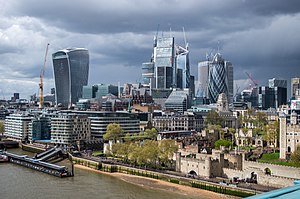Capital city
A capital city, or capital town or capital, is a city or town, specified by law or constitution, by the government of a country, or part of a country, such as a state, province, or county. It usually serves as the location of the government's central meeting place and offices.



Most of the country's leaders, embassy and officials work in the capital city. This does not have to be the case though: Monaco, Nauru, Switzerland and Vatican City are examples of countries that do not have a capital city. Israel said Jerusalem was its capital: Most countries do not recognise this, and most embassies are in Tel Aviv. In Japan, the city of Tokyo, which was the capital, was disbanded in 1943. Today, the 23 city districts (called wards) have the role of capital city. Each district is a city of its own, though. Capital city can also mean a city most famous for something, in this case, Capital of the World is a nickname.
Size
changeCapitals are usually among the largest cities in their regions and often are the biggest. For example, Montevideo is Uruguay's capital and its biggest city. The capital may also be the most important center of commerce, as in London or Bangkok.
However, a capital is not always the largest city in a country. For example, the capital of India is New Delhi, which is smaller than Mumbai.
In countries with subdivisions like the United States, the capitals of the federated states are often not the biggest cities. For example, New York City is the biggest city in the United States and in New York State, but is not the capital of either. The capital of the country is Washington, DC, and the capital of the state is Albany.
There is an unusual case in Canada since the federal capital, Ottawa, is not the largest city in its province, Ontario; Toronto is the largest city in Ontario. Toronto is the capital of Ontario, so Toronto is a provincial capital but not a federal one.
Number
changeSome countries have more than one capital for different purposes. For example, Bolivia has two (Sucre and La Paz) and South Africa has three (Pretoria, Cape Town, and Bloemfontein). In a city-state like Singapore, Monaco, and the Vatican City, the capital is the country.
Not all countries have capitals. Nauru is a country that does not officially have a capital, but the district of Yaren, which is where the government is, can be called the de facto capital. Also, although many people consider the city of Bern in Switzerland to be the capital of the country, it is by law not the capital but the "federal city."
Location
changeCountries can make capitals from cities that are already there, like Athens or Rome; or a new town can be built and made the capital, like Canberra and Alexandria. Countries can change capitals from time to time. Several cities have been the capital of China. The United States once had its capital in Philadelphia and later in New York City but moved to the new city of Washington, D.C. in 1800. Rio de Janeiro was the capital of Brazil until the new city of Brasilia was built between 1956 and 1960.
Reykjavík, the capital of Iceland, is the world's northernmost capital city.[1]
Seat of government
changeMost countries have their seat of government within their capital. However, Malaysia has its capital at Kuala Lumpur, but its seat of government is at Putrajaya. In the Netherlands, the constitution calls Amsterdam the capital, but the seat of government is The Hague.
References
change- ↑ "Reykjavik - Iceland On The Web". www.icelandontheweb.com. Retrieved 2021-09-18.